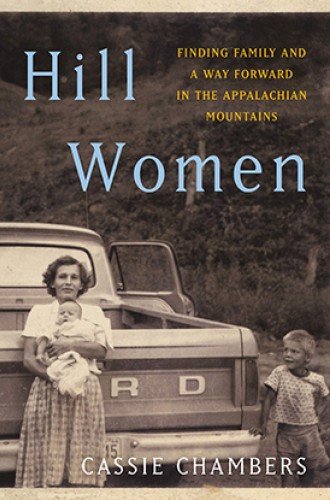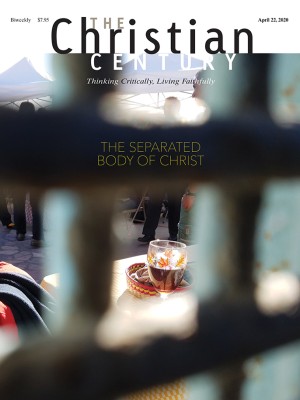A memoir of hardship and gratitude in Appalachia
Cassie Chambers tells family stories and considers the history of the people of Owsley County, Kentucky.
As a child, Cassie Chambers often visited her grandparents and her extended family, who lived about 50 miles away in the hilly outskirts of Owsley County, Kentucky. She loved spending time with her cousins and the rest of her kin, as her grandmother called them. But even during those seemingly halcyon childhood days, Chambers started to realize that her family in the hills had none of the advantages that she took for granted. She remembers, for example, using the outhouse at night while an aunt accompanied her, shining a flashlight to ward off snakes.
Later she saw a cousin leave school, marry disastrously, and have a son who was set on the same doomed path. As Chambers began to understand the poverty and lack of opportunity that beset the residents of Owsley County, she wanted to do something to help. In this deeply felt memoir, Chambers weaves family memories with the history and sociology of the area.
Read our latest issue or browse back issues.
Her earliest memories are of Granny, who babysat her and treated her generously. Granny dropped out of school in the third grade, married Pawpaw at 15, and bore her first child at 16. As Chambers tells it, her grandparents were dirt poor. They worked as sharecroppers and could not afford a car. They rented a farmhouse in a hollow—or holler, as Appalachians call it—known as Cow Creek.
They grew tobacco and raised seven children. In 1991, when Chambers was five, they were able, with the help of charitable neighbors, to install indoor plumbing. The family barely had food to put on the table. Bologna sandwiches were a luxury. Chambers remembers visiting her Owsley family in the winter and awakening at night to frost on the blanket.
Chambers notes that the air constantly held pollutants, from pesticides sprayed on the tobacco crops to coal dust from the mines. Although people were often sick, medical care was scarce. On the main street there were only a few rundown businesses, including two dollar stores and two gas stations.
According to the 2010 census, Owsley County has a median household income of just $19,351. More than 45 percent of its population lives in poverty. Only 38 percent have jobs. More than 20 percent have a disability. One of the poorest counties in the United States, Owsley is more impoverished than the neighboring county of Breathitt, the setting of J. D. Vance’s best-selling Hillbilly Elegy.
Chambers and Vance are both in their midthirties, and in some ways the two authors have similar histories. But while Chambers had a mother who surmounted the difficulties of Appalachian life, Vance did not. Chambers alludes to Hillbilly Elegy in Hill Women, suggesting that Vance doesn’t capture some of the positive aspects of Appalachia, such as the people’s work ethic, determination, and loyalty to each other. At the same time, she recognizes many of the same problems Vance stresses: poverty, lack of opportunity, ignorance, and alcohol and drug abuse.
Chambers also mentions then Senator Barack Obama’s 2008 comments about bitter people who lose jobs and cling to guns and religion. She notes, as her Aunt Ruth was fond of saying, that sometimes it’s worth clinging to some of the “old ways.” But Ruth also knew which traditions could be left behind. Chambers recalls attending church one time and feeling out of place as the only girl wearing pants. Aunt Ruth said, “Why, Lord a mercy, child! Jesus don’t care what you’re wearing.”
Ruth had once hoped to be the first in her family to finish high school, but these hopes were dashed when she got scarlet fever and missed a year of school. On another level, however, Ruth’s illness was fortuitous. Pawpaw died at a fairly young age. He had dementia, and his body was wracked from years of backbreaking work. Ruth, who had spent her days helping him with the crops and the animals, was able to take over the farm.
Chambers dedicates the book to her mother, Wilma. Pushed by her mother and sister, Wilma escaped the privation of life in Cow Creek. She studied early childhood education at Berea College. There she met her future husband, who studied economics and later became a dean.
Both of Chambers’s parents encouraged their daughter to get an education. She did, despite feeling awkward about her Appalachian roots and her lack of social skills. She ultimately graduated from Yale, went to the London School of Economics, and received a law degree from Harvard.
After Harvard, Chambers moved back to eastern Kentucky so she could use her degree to represent some of the country’s poorest women as they struggle with unfair laws. Chambers tells stories about some of these clients. She also details her work passing Jeanette’s Law, which exempts a petitioner for divorce from paying the attorney fees for an incarcerated spouse.
Despite the memoir’s subtitle, Chambers hasn’t found a way forward for those living in Appalachia. But she’s still working at it. She doesn’t claim in the book that she’s practicing the spiritual work of mercy, but she is.







